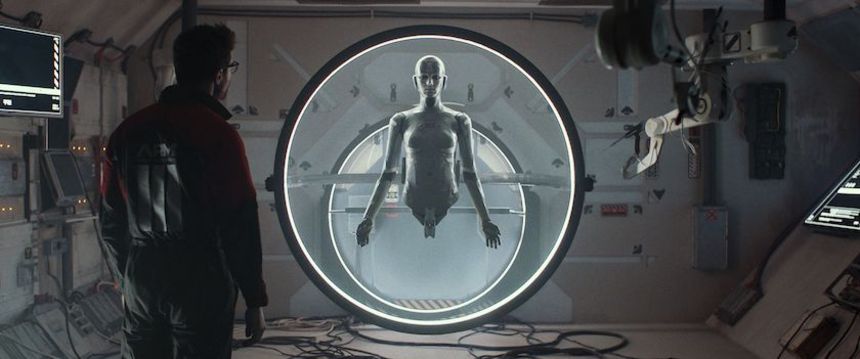Review: ARCHIVE Collects Underdeveloped Sci-Fi Ideas and Themes
Theo James, Stacy Martin, Rhona Mitra, and Toby Jones star in Gavin Rothery's sci-fi adventure.

If a successful run in an ongoing franchise can sustain an otherwise unsustainable career, then the opposite can be also true: A flailing, floundering franchise abruptly ending with a bang-free, never-completed final entry can irrevocably damage any career dependent on all-important, if difficult to quantify, momentum.
That fate seems to have befallen Theo James, a Brit actor with a modest proclivity for American accents who gained a modicum of big-screen fame or name recognition playing second lead to Shailene Woodley in the Divergent sci-fi/action franchise, a second-tier Hunger Games-lite YA series penned by Veronica Roth. Since that series’ ignominious end four years ago on a never-concluded cliffhanger, James’ onscreen credits include How It Ends, a post-apocalyptic thriller that went straight to streaming, Sanditon, last year’s prestige miniseries adaptation of Jane Austen’s unfinished 1817 novel, along with respectable voice work on The Dark Crystal: Age of Resistance and Castlevania.
Good thing, then, that James has turned to producing with Archive, an AI-centered sci-fi drama filled with a mix of ideas and themes both familiar and provocative written and directed by longtime production/conceptual designer Gavin Rothery, making his feature-length, narrative debut here. James appears in practically every scene in Archive as George Almore, a rock-star software programmer, mechanical engineer, and all-around Frankensteinian genius.
Motivated by a neurotic, obsessive, ultimately self-destructive desire to resurrect his recently dead wife, Julia (Stacy Martin), Almore spends days and nights, including weekends, at a remote, super-secret, corporate facility developing the next, revolutionary step in artificial intelligence, a fully functioning, self-aware, independent android all but indistinguishable from the real, unsimulated thing (i.e., “more human than human”) with only two earlier prototypes, J-1, a lumbering, almost mute robot with the intellectual development of a five- or six-year-old, and J-2 (also voiced by Martin), a humanoid robot with the mental and emotional age of a teenager.
George hopes to make a next-order, next-level evolutionary leap with the third, and final, prototype, J-3 (also Martin), giving her not just his late wife’s memories — conveniently backed up on a super-advanced hard drive stored in a featureless black slab sitting in the middle of his lab — but a fully formed personality of his own. George awakens J-3 before her humanoid body has been finished (she’s missing legs), giving her a Borg Queen-like appearance for more than half of Archive’s running time.
Suspended from a high-tech harness, J-3 almost immediately realizes she’s at George’s mercurial nature, though Rothery deliberately sidesteps exploring or examining the more troubling themes underlying AI in fiction or film like Alex Garland did in Ex Machina six years ago. Where Garland used AI to critique and deconstruct Western ideas of (toxic) masculinity, Rothery chooses a more traveled, less overtly critical path of Mary Shelley’s monsters and men (sometimes one and the same),with George the unstable, genius inventor attempting to subvert the laws of nature for selfish, self-entitled ends and learning the equivalent of a wrenchingly bitter life-lesson in the process.
Except, unfortunately, that Rothery, apparently eager to let everyone know that he's a Black Mirror fan, simultaneously overturns and undermines any ideas and themes he’s spent the better part of two hours developing via a wholly unnecessary, late-film plot turn. While it’s forgivable in a first-time filmmaker who either runs out of narrative ground or overthinks what he imagines audiences want from a film like Archive, it still leaves a sour taste in the final moments before the credits roll.
Until then, though, James delivers a suitably understated, persuasive performance as the unbalanced, obsessive George, often carrying scenes practically by himself or playing against the expressionless J-2. Once J-3, a composite of an impressive Martin, stellar make-up, and convincing visual effects, arrives in the film, Archive switches primarily into a two-character drama, leaving J-2 the odd AI out.
To Rothery’s credit, he makes J-2’s fate far more poignant and moving than it deserves to be. Rothery inadvertently gives audiences a glimpse into an intriguing short or even feature-length film about an AI or self-aware robot facing predictable obsolescence when her makers discover the next best, shiny thing.
The film is available from Vertical Entertainment to watch via virutal cinema screenings, On Demand, and Digital on July 10, 2020.







